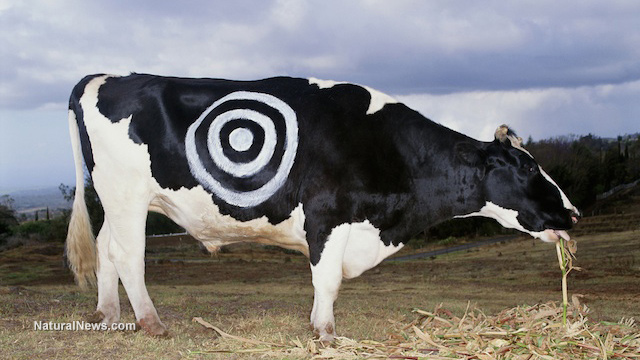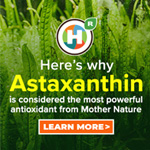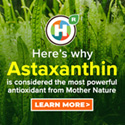Not a joke: California to actually begin regulating cow farts
Saturday, September 10, 2016 by: Samantha Debbie
Tags: climate change, cow farts, greenhouse gases

(NaturalNews) Cow manure is producing too much methane, according to the California Legislature, which seeks to substantially reduce what it considers climate change emissions over the next decade and a half. Officials recently approved regulations on "cow flatulence and manure," both of which supposedly contribute to greenhouse gas releases.
The bill's author, Democratic Senator Ricardo Lara of Bell Gardens, approved the measure recently and agreed to give dairy farms more time to comply. Regulators hope to reduce methane emissions to 40 percent below 2013-levels by the year 2030, reports CBS News.
The measure also aims to "significantly increase" composting in order to reduce the dumping of food waste in local landfills, which officials say releases methane gases upon breakdown.
Factory farming, as well as the commercial food sector, are among the most harmful industries when it comes to the environment, sustainability and public health.
Why factory farming is one of the most environmentally-devastating industrial practices
While the evidence connecting man-made greenhouse gases to global warming is weak at best, there's no debating the fact that Confined Animal Feeding Operations (CAFOs) contribute to greenhouse gas emissions – and the practice carries many implications.An estimated "65 billion animals worldwide, including cows, chickens and pigs, are crammed into CAFOs. These animals are literally imprisoned and tortured in unhealthy, unsanitary and unconscionably cruel conditions," according to EcoWatch.
"Sickness is the norm for animals who are confined rather than pastured, and who eat GMO corn and soybeans, rather than grass and forage as nature intended. To prevent the inevitable spread of disease from stress, overcrowding and lack of vitamin D, animals are fed a steady diet of antibiotics."
Factory farming releases large amounts of greenhouse gases into the atmosphere, more so than the entire global transportation industry. Furthermore, CAFOs create severe air pollution. In fact, testing conducted at factory farms found the air to be dirtier than in America's most polluted cities.
But is regulating cow farts really the answer? No, the answer is to eliminate factory farming. Unfortunately, California is big on "regulating" things and less big on actually solving problems.
Experts admit they are unsure of how to actually regulate cow flatulence
ABC News reports that experts aren't even sure if the technology exists to reduce cow flatulence. Yet the legislature approved a $900 million spending bill that, among other things, seeks to regular cow farts.Lawmakers agreed "to spend nearly two-thirds of the available money generated by the state's cap on carbon pollution under a deal between the Democratic governor and top Democratic legislative leaders."
"The deal includes $363 million for clean vehicle incentives and hundreds of millions for urban plants and efforts to create cleaner air in disadvantaged communities. It also includes $50 million to reduce emissions of methane and other climate-changing gases associated with dairy production and another $40 million for landfills," according to reports.
The measure was passed just weeks after Democrats voted to extend California's "landmark climate change law" for another 10 years. Some call the climate change law the most aggressive in the nation.
Those in opposition to it include Big Oil and Republicans, the latter of which describe the program as an illegal tax.
In order for the legislation to become law, it will have to be approved by Democratic Governor Jerry Brown.
Sources:
EcoWatch.com
ABCNews.go.com
SanFrancisco.CBSLocal.com
Science.NaturalNews.com
Climate change at FETCH.news
Get independent news alerts on natural cures, food lab tests, cannabis medicine, science, robotics, drones, privacy and more.
Take Action: Support Natural News by linking to this article from your website
Permalink to this article:
Embed article link: (copy HTML code below):
Reprinting this article:
Non-commercial use OK, cite NaturalNews.com with clickable link.
Follow Natural News on Facebook, Twitter, Google Plus, and Pinterest
- TAKE IT DOWN Act advances in Congress amid free speech concerns
- Gardening tips: 15 Simple tricks to double your garden’s yield this season
- Survival 101: Dangerous places to avoid when disaster strikes
- Hospital staffers sound alarm after 10 nurses were diagnosed with BRAIN TUMORS
- Nature’s arsenal: How plant compounds power military survival and healthcare in crisis
- Kawasaki unveils rideable ROBOT HORSE powered by hydrogen
- Criminal referral requests filed against Fauci and top COVID officials in seven states
- DOJ and ATF kill Biden’s “Zero Tolerance” firearms dealer policy
- Widespread social and economic unrest: Steve Quayle issues urgent financial warning of imminent asset collapse in new interview with Mike Adams
- New studies ignite debate: Fluoride linked to autism and ADHD, prompting calls for policy reassessment
- Analysis: The coming economic collapse, a mass uprising and Trump's three secret weapons to halt the growing revolt
- “Prepare Tribe: Prepare, Protect, Provide” on BrightU: How to build a disaster-proof shelter in the middle of nowhere
- Amazon's Kuiper satellite launch delay highlights uphill battle against Musk's Starlink
- Israeli lobbyists boast of controlling US national security policy in leaked AIPAC audio
- Aerosolized bioweapons? Strange “diploid biomasses” falling out of the sky in Florida captured under the microscope
- Barley: A nutrient-dense ancient grain with modern benefits
- Sovereign debt paradox: U.S.-China mutual holdings fuel geopolitical tensions
- Federal appeals court authorizes DOGE access to Education, Treasury and OPM records
- Tulsi Gabbard leads charge against the Biden regime’s global censorship of the 'Disinformation Dozen'
- Fauci is back in the limelight, and he’s busy promoting a future COVID or FLU pandemic
- Aerosolized bioweapons? Strange “diploid biomasses” falling out of the sky in Florida captured under the microscope
- Analysis: The coming economic collapse, a mass uprising and Trump's three secret weapons to halt the growing revolt
- Widespread social and economic unrest: Steve Quayle issues urgent financial warning of imminent asset collapse in new interview with Mike Adams
- Kiss Your Genetic Privacy Good-Bye! 23andMe Gets Green Light to Sell Your Intimate Genetic Details to Anyone They Want
- Tulsi Gabbard takes aim at censorship: Justice for the ‘Disinformation Dozen’
- Mike Adams releases country western hit single: Goin’ Back in Time is Comin’ Home
- U.S. lawmakers investigate Meta over alleged China collaboration
- CLOT SHOT PLANDEMIC UNFOLDING: Fibrous, rubbery clots caused by covid injections have prion-like seeding activity
- Chemtrails unveiled: How the CIA and Big Business are manipulating the weather for profit
- How Israeli military-connected corporations are secretly controlling your online privacy
- European Court of Justice: Healthcare professionals who promoted or administered COVID-19 vaccines are CRIMINALLY LIABLE for any harm caused
- DEATH by VACCINE or face PRISON time: Canadian Freedom Convoy leaders CONVICTED for protesting forced vaccination during the Covid Plandemic
- Defunding DEADLY mRNA jabs: Government funding for mRNA technology being scrutinized and sidelined until proven "safe and effective" for real
- Federal employees whine over DOGE's new directive requiring them to do a 5-point summary of weekly accomplishments
- U.S. approves new Russian ambassador as diplomatic thaw continues
- Curcumin’s ancient healing power supercharges muscle recovery, and its effects are compounded with anti-inflammatory foods and supplements
- Newly released JFK files reveal Pentagon's role in creating Lyme disease and covid in the same lab
- Analysis: The coming economic collapse, a mass uprising and Trump's three secret weapons to halt the growing revolt
- Mike Adams releases country western hit single: Goin’ Back in Time is Comin’ Home
- Aerosolized bioweapons? Strange “diploid biomasses” falling out of the sky in Florida captured under the microscope
- Kiss Your Genetic Privacy Good-Bye! 23andMe Gets Green Light to Sell Your Intimate Genetic Details to Anyone They Want
- Dr. Mike Yeadon releases 15-minute testimony - WATCH - about genocidal intent of COVID “vaccines”
- Trump reverses course on Gaza plan, says “nobody is expelling Palestinians”
- MEDICAL BOMBSHELL: FDA admits Covid mRNA 'Vaccines' CAUSE CANCER
- European Court of Justice: Healthcare professionals who promoted or administered COVID-19 vaccines are CRIMINALLY LIABLE for any harm caused
- The Health Ranger releases “Vaccine Zombie” song and music video, using AI-animated zombies for the music video
- 5 Simple steps to boost your brainpower: How to strengthen executive function in a distracted world
- A lack of integrity in Academia: Harvard professor found GUILTY of fraudulent research to promote CRT theory
- Federal employees whine over DOGE's new directive requiring them to do a 5-point summary of weekly accomplishments
- EPA advisor admits the agency is funneling billions to climate groups ahead of Trump’s return to White House
- California's social media censorship law struck down: A victory for free speech or a threat to online safety?
- Space war brewing? Russia threatens to destroy Starlink satellites
- Survival 101: Effective EMF blocking techniques
- Rep. Nancy Mace introduces bill to ban biological males from female facilities on federal property
- Red Cross issues warning to stop blood plasma donations from vaccinated people
- Scientists confirm: GENIUS brain function can be spontaneously unleashed in humans without any apparent cause
- EPA advisor admits the agency is funneling billions to climate groups ahead of Trump’s return to White House
- HYSSOP: What research reveals about the health benefits of this ancient holy herb
- Two containers with completed ballots fall out of truck in Florida
- Newly released JFK files reveal Pentagon's role in creating Lyme disease and covid in the same lab
- Global leaders unite to clamp down on “misinformation” with UN-backed Cascais Declaration
- BREAKING: 2025 NDAA authorizes mandatory military draft of WOMEN across America… as Pentagon pursues global NUCLEAR war with both Russia and China at the same time
- Michael Yon warns of a ZIONIST TAKEOVER in Trump’s second administration
- Ozempic and Wegovy weight loss drugs are injectable LIZARD VENOM PEPTIDES that may unleash a devastating wave of organ failure… side effects align with symptoms of SNAKE BITES
- The Health Ranger releases “Vaccine Zombie” song and music video, using AI-animated zombies for the music video
- Mike Adams releases country western hit single: Goin’ Back in Time is Comin’ Home
- BOMBSHELL: DNA testing kits are a SCAM to develop ethnic-specific bioweapons
- Israeli soldiers accused of even more torture and abuse in the West Bank
- These 13 countries just signed an agreement to engineer a global FAMINE by destroying food supply
- NASA admits that climate change occurs because of changes in Earth’s solar orbit, and NOT because of SUVs and fossil fuels
- Fully vaccinated about to see “tsunami” of illness and death, warns virologist
- RFK Jr. clears key hurdle: Sen. Susan Collins backs controversial HHS nominee, signaling a new era for health policy
Science News & Studies
Medicine News and Information
Food News & Studies
Health News & Studies
Herbs News & Information
Pollution News & Studies
Cancer News & Studies
Climate News & Studies
Survival News & Information
Gear News & Information
News covering technology, stocks, hackers, and more



"Big Tech and mainstream media are constantly trying to silence the independent voices that dare to bring you the truth about toxic food ingredients, dangerous medications and the failed, fraudulent science of the profit-driven medical establishment.
Email is one of the best ways to make sure you stay informed, without the censorship of the tech giants (Google, Apple, Facebook, Twitter, YouTube, etc.). Stay informed and you'll even likely learn information that may help save your own life."
–The Health Ranger, Mike Adams












































